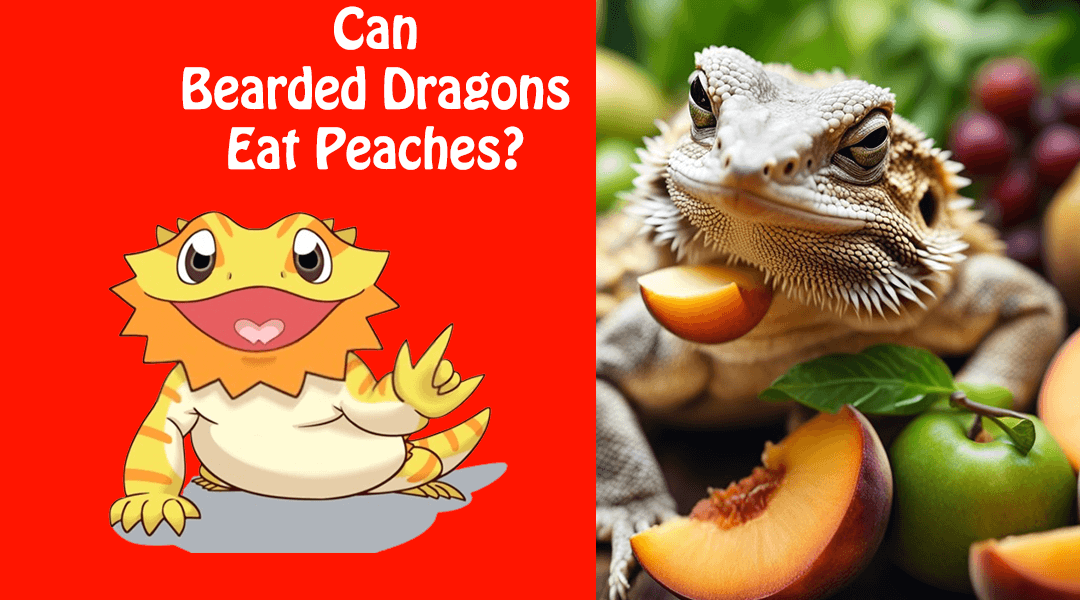Peaches are a delicious fruit that many of us enjoy eating. However, if you’re a bearded dragon owner, you may be wondering whether it’s safe to share this sweet treat with your scaly friend. In this article, we’ll answer the question “Can bearded dragons eat peaches?” and provide you with all the information you need to know.
Bearded dragons are omnivores, meaning they eat both plant and animal matter. While they primarily feed on insects and leafy greens, they can also consume some fruits in moderation. Peaches are one of the many fruits that can be added to your bearded dragon’s diet, but there are some things to keep in mind before doing so.
In the following paragraphs, we’ll explore the nutritional benefits and potential risks of feeding peaches to your bearded dragon. We’ll also provide you with some tips on how to prepare and serve this fruit to ensure your pet’s safety and well-being.
Understanding Bearded Dragons’ Diet
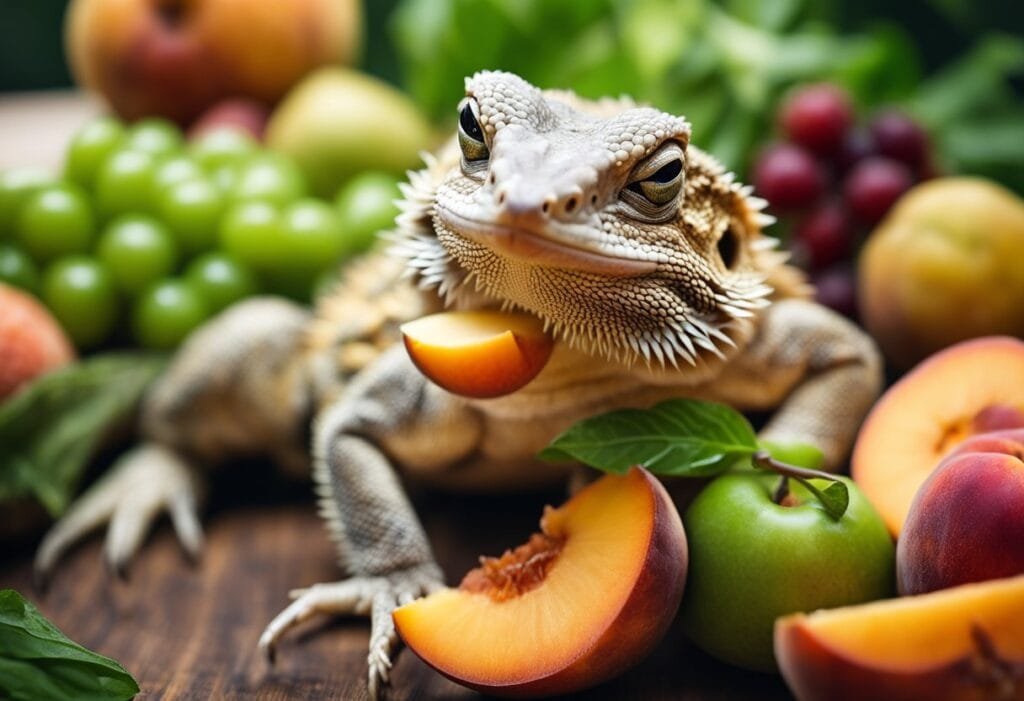
Bearded dragons are omnivorous, meaning they eat both plants and animals. In the wild, they eat a variety of insects, fruits, and vegetables. As pets, it’s important to provide a balanced diet that meets their nutritional needs.
Here are some key things to keep in mind when feeding your bearded dragon:
- Protein: Bearded dragons need protein for growth and development. Insects like crickets, mealworms, and dubia roaches are great sources of protein. Avoid feeding them wild-caught insects, as they may have been exposed to pesticides or other harmful substances.
- Vegetables: Bearded dragons need a variety of vegetables to get the vitamins and minerals they need. Some good options include collard greens, kale, mustard greens, and squash. Avoid feeding them spinach, as it can bind calcium and lead to health problems.
- Fruits: While fruits are not a major part of a bearded dragon’s diet, they can be given as an occasional treat. Some good options include strawberries, blueberries, and peaches. Avoid feeding them citrus fruits, as they can be too acidic.
- Calcium: Bearded dragons need calcium for strong bones and overall health. Dusting their food with a calcium supplement is recommended, especially if they are not getting enough calcium from their diet.
It’s important to note that bearded dragons have specific dietary needs based on their age, size, and overall health. Consult with a veterinarian who specializes in reptiles to ensure that your bearded dragon is getting the proper nutrition.
Peaches and Bearded Dragons
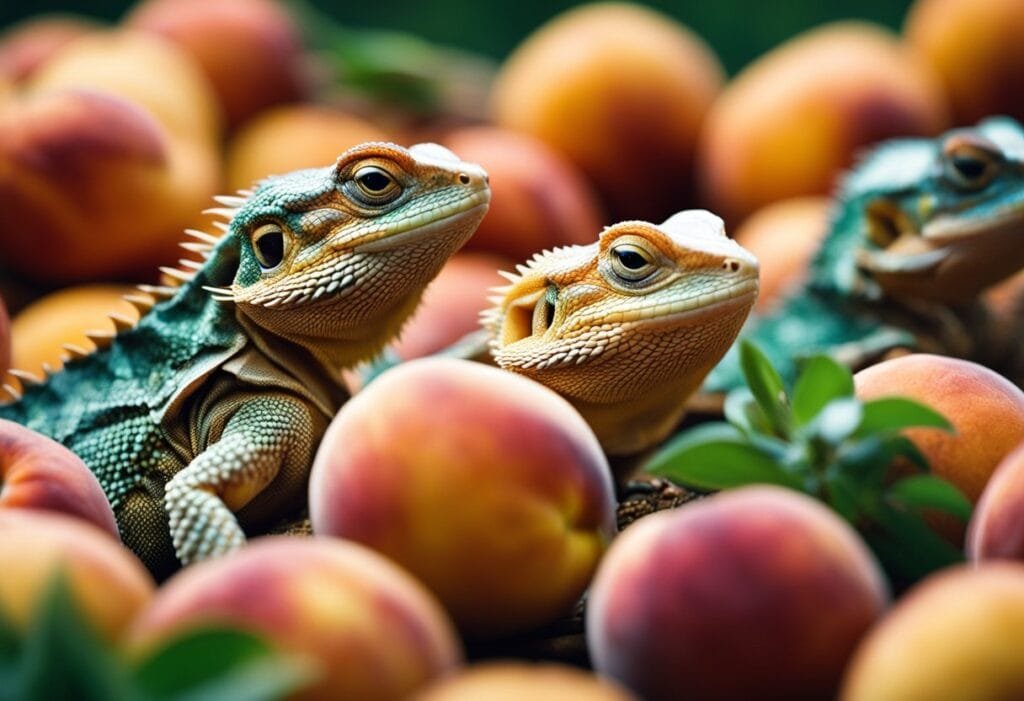
Peaches are a delicious fruit that many people enjoy eating, but can bearded dragons eat them too? We have done some research to answer this question.
Firstly, it is important to note that bearded dragons are omnivores, meaning they eat both plants and animals. However, their diet should primarily consist of insects and leafy greens. Fruits should only be given as an occasional treat.
When it comes to peaches, they are not toxic to bearded dragons and can be fed in moderation. However, they should not be a regular part of their diet. Peaches are high in sugar, which can lead to obesity and other health problems if consumed excessively.
If you do decide to give your bearded dragon a piece of peach, make sure to remove the pit and cut it into small, bite-sized pieces. Also, make sure to wash the peach thoroughly to remove any pesticides or other harmful chemicals.
In summary, while peaches can be given to bearded dragons as a treat, they should not be a regular part of their diet. As with any new food, it is important to introduce it slowly and in small amounts to avoid any digestive problems.
Nutritional Value of Peaches
Peaches are a delicious and nutritious fruit that can be a great addition to a bearded dragon’s diet. They are low in fat and high in fiber, making them a healthy snack option. Here are some of the key nutritional benefits of peaches:
- Vitamin C: Peaches are a good source of vitamin C, which is essential for a healthy immune system. One medium-sized peach contains about 10% of the recommended daily intake of vitamin C for an adult bearded dragon.
- Vitamin A: Peaches are also a good source of vitamin A, which is important for maintaining healthy eyes and skin. One medium-sized peach contains about 6% of the recommended daily intake of vitamin A for an adult bearded dragon.
- Fiber: Peaches are high in fiber, which can help regulate digestion and prevent constipation. One medium-sized peach contains about 2 grams of fiber.
- Water: Peaches are also high in water content, which can help keep bearded dragons hydrated. One medium-sized peach contains about 120 grams of water.
It’s important to note that while peaches can be a healthy snack option for bearded dragons, they should not make up the majority of their diet. Bearded dragons require a balanced diet that includes a variety of fruits, vegetables, and protein sources. It’s also important to feed them in moderation, as too much fruit can lead to digestive issues.
Benefits of Feeding Peaches to Bearded Dragons
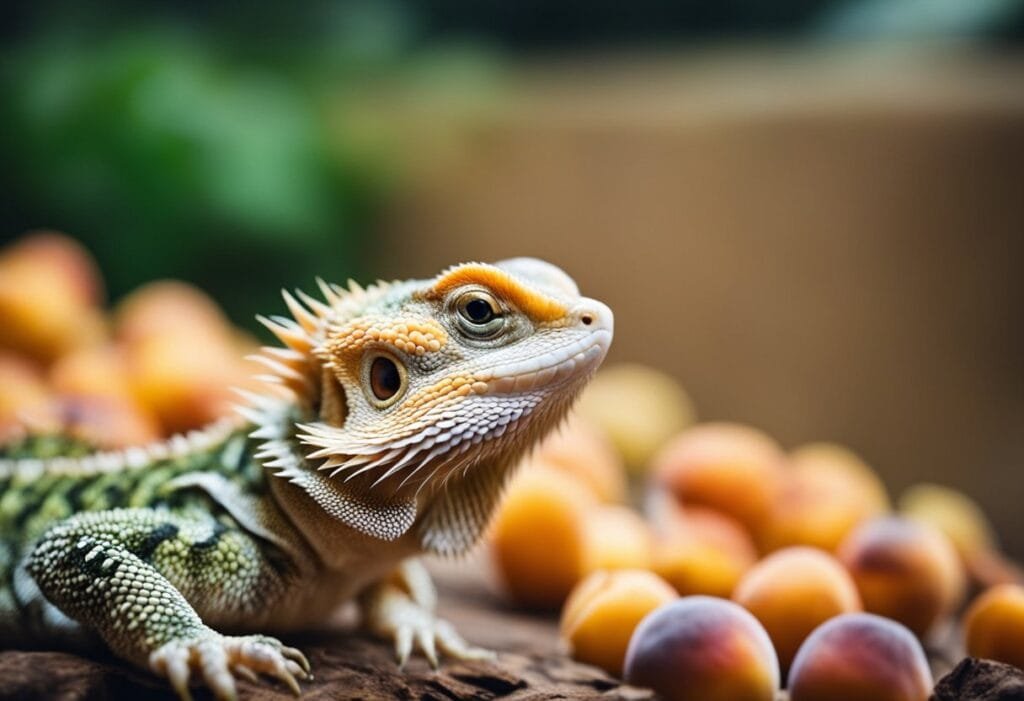
Feeding bearded dragons with peaches can be a great way to provide them with a nutritious diet. Here are some benefits of feeding peaches to bearded dragons:
- Rich in Vitamins and Minerals: Peaches are an excellent source of vitamins A and C, which are essential for the growth and development of bearded dragons. They also contain potassium, calcium, and iron, which are necessary for maintaining healthy bones and muscles.
- High in Fiber: Peaches are high in fiber, which helps in digestion and prevents constipation in bearded dragons. It also helps in maintaining a healthy gut flora.
- Low in Fat: Peaches are low in fat, making them an excellent choice for bearded dragons who are prone to obesity.
- Hydrating: Peaches are high in water content, which helps in keeping bearded dragons hydrated and prevents dehydration.
It is important to note that while peaches can be a healthy addition to a bearded dragon’s diet, they should not be the sole source of nutrition. A balanced diet consisting of a variety of vegetables, fruits, and insects is necessary for their overall health and well-being.
When feeding peaches to your bearded dragon, make sure to remove the pit as it can be a choking hazard and contains trace amounts of cyanide. Also, wash the peach thoroughly to remove any pesticides or chemicals that may be present on the skin.
Overall, feeding peaches to bearded dragons can be a nutritious and delicious treat for them.
Potential Risks of Feeding Peaches to Bearded Dragons
When it comes to feeding your bearded dragon, it’s important to choose the right foods. While peaches may seem like a healthy and tasty option, they do come with some potential risks. Here are a few things to consider before feeding your bearded dragon peaches:
High Sugar Content
Peaches are a fruit, and like many fruits, they contain high levels of sugar. While a small amount of sugar is okay for your bearded dragon, too much can lead to health problems such as obesity and diabetes. It’s important to limit the amount of fruit you feed your bearded dragon, including peaches.
Pit and Skin
The pit and skin of the peach can also pose a potential risk to your bearded dragon. The pit is hard and difficult to digest, and can cause intestinal blockages if ingested. The skin of the peach can also be tough and difficult to digest, and may cause digestive issues for your bearded dragon.
Pesticides and Chemicals
Peaches, like many fruits and vegetables, are often treated with pesticides and other chemicals. These chemicals can be harmful to your bearded dragon if ingested. It’s important to thoroughly wash and rinse any fruit or vegetable before feeding it to your bearded dragon, and to choose organic options when possible.
Overall, while peaches can be a tasty treat for your bearded dragon, it’s important to feed them in moderation and to take precautions to avoid any potential risks.
How to Prepare Peaches for Your Bearded Dragon
When feeding your bearded dragon peaches, it is important to properly prepare them to ensure they are safe and healthy for your pet. Here are some steps to follow when preparing peaches for your bearded dragon:
- Wash the peach thoroughly with water to remove any dirt or debris.
- Cut the peach into small, bite-sized pieces that are easy for your bearded dragon to eat. Remove the pit and any tough skin.
- If your bearded dragon is a picky eater, you can try dusting the peach pieces with calcium powder to make them more appealing.
- Offer the peach pieces to your bearded dragon as a treat, in addition to their regular diet of insects and vegetables.
It is important to note that while peaches can be a healthy and tasty treat for your bearded dragon, they should not make up a significant portion of their diet. Be sure to offer a variety of foods to ensure your pet is getting all the nutrients they need.
Overall, with proper preparation and moderation, peaches can be a great addition to your bearded dragon’s diet.
Alternatives to Peaches for Bearded Dragons
If you’re looking for some variety in your bearded dragon’s diet, you may be wondering what other fruits and vegetables are safe for them to eat. While peaches are a great option, there are plenty of other options available that can provide your pet with the nutrients they need.
Here are a few alternatives to peaches that you can try:
- Apples: These are a great source of fiber and vitamin C, and most bearded dragons love them. Just be sure to remove the seeds and core before feeding them to your pet.
- Blueberries: These are a great source of antioxidants and vitamin C, and they’re also low in sugar. Just be sure to wash them thoroughly before feeding them to your pet.
- Carrots: These are a great source of vitamin A and fiber, and they’re also low in sugar. Just be sure to chop them up into small pieces before feeding them to your pet.
- Collard Greens: These are a great source of calcium and vitamin K, and they’re also low in oxalates. Just be sure to wash them thoroughly before feeding them to your pet.
- Green Beans: These are a great source of fiber and vitamin C, and they’re also low in sugar. Just be sure to chop them up into small pieces before feeding them to your pet.
Remember, when introducing new foods to your bearded dragon, it’s important to do so slowly and in small quantities to avoid digestive issues. And always be sure to do your research ahead of time to ensure that the foods you’re feeding your pet are safe and healthy for them.
Frequently Asked Questions
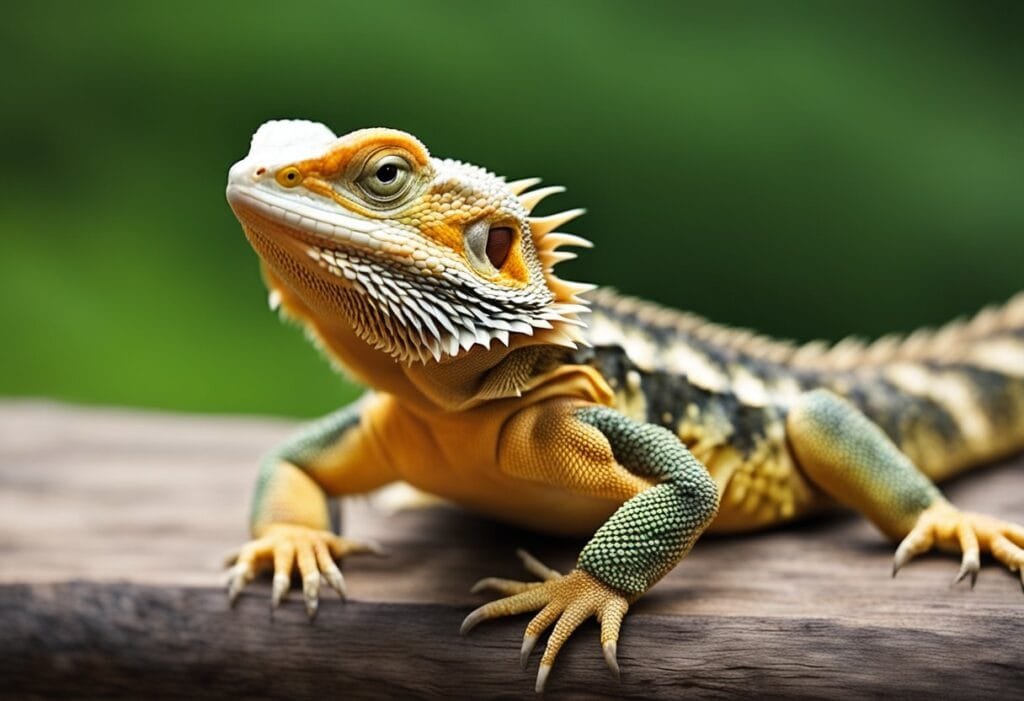
What fruits can bearded dragons eat?
Bearded dragons can eat a variety of fruits, but it is important to remember that their diet should consist mainly of insects and vegetables. Safe fruits include apples, blueberries, raspberries, and strawberries. However, fruits with high sugar content should be given in moderation.
Can bearded dragons eat canned peaches?
Canned peaches are not recommended for bearded dragons. They often contain added sugar and preservatives that can be harmful to your pet. It is best to stick to fresh fruits and vegetables that are safe for your bearded dragon to eat.
Can bearded dragons eat mango?
Mango is safe for bearded dragons to eat in moderation. It is a good source of vitamins and minerals, but it is also high in sugar. Too much mango can cause digestive problems and obesity in your pet.
Can bearded dragons eat pineapple?
Pineapple is safe for bearded dragons to eat in moderation. It is a good source of vitamins and minerals, but it is also high in sugar. Too much pineapple can cause digestive problems and obesity in your pet.
Can bearded dragons eat strawberries?
Strawberries are safe for bearded dragons to eat in moderation. They are a good source of vitamins and minerals, but they are also high in sugar. Too many strawberries can cause digestive problems and obesity in your pet.
Can bearded dragons eat grapes?
Grapes are safe for bearded dragons to eat in moderation. They are a good source of vitamins and minerals, but they are also high in sugar. Too many grapes can cause digestive problems and obesity in your pet.

I, Mark Antonelli am highly interested in pet care tips. The experiences I gained through university life in animal sciences were also helpful to identify the best tricks for caring for and feeding varying kinds of pets. I know the majority of people love to own a pet. Yet, there is a guilty of owing a Bearded Dragon due to a lack of information about how much friendly and peaceful they are. I thought of filling this gap with detailed writings about this Pogona genus Bearded Dragon. All my team is also giving me great support to fulfil my mission. Hope you will enjoy the journey with us.

